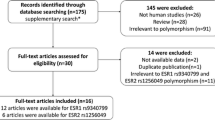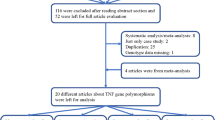Abstract
Purpose
The main purpose of the study was to evaluate the effect of two polymorphisms in the estrogen receptor alpha, rs2077647 and rs3798577, on the development of prostate cancer, their correlation with selected clinical characteristics, as well as consideration of potential interactions between four estrogen receptor alpha polymorphisms (rs2077647, rs3798577, PvuII, XbaI).
Methods
The study was performed using 395 patients with histologically verified prostate cancer and 253 healthy male controls.
Results
The CC genotype of rs2077647 was significantly associated with prostate cancer (OR = 1.61). No association was found between rs3798577 polymorphism and prostate cancer. After stratification of patients according to the age at diagnosis and Gleason score, we observed significant correlation between rs2077647 polymorphism and prostate cancer risk in patients diagnosed before the age of 60 as well as patients with Gleason score <7, while rs3798577 was significantly associated with prostate cancer risk development in patients older than 60 and with Gleason score ≥7. Double analysis of each combination of four studied polymorphisms showed that presence of at least three variant alleles was associated with prostate cancer risk in all combinations, while each containing rs3798577 was significantly associated with development of high-grade carcinomas.
Conclusions
The present study suggests that rs2077647 polymorphism may be a risk factor for prostate cancer especially in patients diagnosed before the age of 60, while rs3798577 polymorphism could probably serve rather as promoting factor in combination with other polymorphisms in estrogen receptor alpha contributing preferably to development of high-grade carcinomas.
Similar content being viewed by others
References
Anghel A, Narita D, Seclaman E, Popovici E, Anghel M, Tamas L (2010) Estrogen receptor alpha polymorphisms and the risk of malignancies. Pathol Oncol Res 16:485–496
Attia DM, Ederveen AG (2012) Opposing roles of ERalpha and ERbeta in the genesis and progression of adenocarcinoma in the rat ventral prostate. Prostate 72:1013–1022
Balistreri CR, Caruso C, Carruba G, Miceli V, Candore G (2011) Genotyping of sex hormone-related pathways in benign and malignant human prostate tissues: data of a preliminary study. OMICS 15:369–374
Bonkhoff H, Berges R (2009) The evolving role of oestrogens and their receptors in the development and progression of prostate cancer. Eur Urol 55:533–542
Cansel-Tassel G, Latil A, Rousseau F, Mangin P, Bottius E, Escary J-L, Berthon P, Cussenot O (2003) Association study of polymorphisms in the human estrogen receptor alpha gene and prostate cancer risk. Eur Urol 44:487–490
Chadwick CC, Chippari S, Matelan E, Borges-Marcucci L, Eckert AM, Keith JC, Albert IM, Leathurby Y, Harris HA, Bhat RA, Ashwell M, Trybulski E, Winneker RC, Adelman SJ, Steffan RJ, Harnish DC (2005) Identification of pathway-selective estrogen receptor ligands that inhibit NF-kappaB transcriptional activity. Proc Natl Acad Sci USA 102:2543–2548
Chae YK, Huang HY, Strickland P, Hoffman SC, Helzlsouer K (2009) Genetic polymorphisms of estrogen receptors a and b and the risk of developing prostate cancer. Plos One 4(8):e6523
Ehara H, Koji T, Deguchi T, Yoshii A, Nakano M, Nakane PK et al (1995) Expression of estrogen receptor in diseased human prostate assessed by non-radioactive in situ hybridization and immunohistochemistry. Prostate 27:204–313
Evans RM (1988) The steroid and thyroid hormone receptor superfamily. Science 240:889–895
Fukatsu T, Hirokawa Y, Araki T, Hioki T, Muraka T (2004) Genetic polymorphisms of hormone-related genes and prostate cancer risk in the Japanese population. Anticancer Res 24:2431–2437
Goldstein JS, Sites CK (2002) Selective modulation of sex steroids. Ageing Res Rev 1:17–28
Hernández J, Balic I, Johnson-Pais TL, Higgins BA, Torkko KC, Thompson IM, Leach RJ (2006) Association between an estrogen receptor alpha gene polymorphism and the risk of prostate cancer in black men. J Urol 175:523–527
Holt SK, Kwon EM, Fu R, Kolb S, Feng Z, Ostrander EA, Stanford JL (2013) Association of variants in estrogen-related pathway genes with prostate cancer risk. Prostate 73:1–10
Jurečeková J, Kmeťová Sivoňová M, Evinová A, Kliment J, Dobrota D (2013) The association between estrogen receptor alpha polymorphisms and the risk of prostate cancer in Slovak population. Mol Cell Biochem 381:201–207
Leav I, Lau KM, Adams JY, McNeal JE, Taplin ME, Wang J et al (2001) Comparative studies of the estrogen receptors beta and alpha and the androgen receptor in normal human prostate glands, dysplasia, and in primary and metastatic carcinoma. Am J Pathol 159:79–92
Levin ER (2005) Integration of the extranuclear and nuclear actions of estrogen. Mol Endocrinol 19:1951–1959
Levin ER, Pietras RJ (2008) Estrogen receptors outside the nucleus in breast cancer. Breast Cancer Res Treat 108:351–361
Li N, Dong J, Hu Z, Shen H, Dai M (2010) Potentially functional polymorphisms in ESR1 and breast cancer risk: a meta-analysis. Breast Cancer Res Treat 121:177–184
Menasce LP, White GR, Harrison CJ, Boyle JM (1993) Localization of the estrogen receptor locus (ESR) to chromosome 6q25.1 by FISH and a simple post-FISH banding technique. Genomics 17:263–265
Ponglikitmongkol M, Green S, Chambon P (1988) Genomic organization of the human oestrogen receptor gene. EMBOJ 7:3385–3388
Risbridger GP, Bianco JJ, Ellem SJ, McPherson SJ (2003) Oestrogens and prostate cancer. Endocr Relat Cancer 10:187–191
Royuela M, de Miguel MP, Bethencourt FR, Sanchez-Chapado M, Fraile B, Arenas MI et al (2001) Estrogen receptors alpha and beta in the normal, hyperplastic and carcinomatous human prostate. J Endocrinol 168:447–454
Safarinejad MR, Safarinejad S, Shafiei N, Safarinejad S (2012) Estrogen receptors alpha (rs2234693 and rs9340799), and beta (rs4986938 and rs1256049) genes polymorphism in prostate cancer: evidence for association with risk and histopathological tumor characteristics in Iranian men. Mol Carcinog 51(Suppl 1):E104–E117
Sissung TM, Danesi R, KirklandT Baum CE, Ockers SB, Stein EV, Venzon D, Price DK, Figg WD (2011) Estrogen receptor α and aromatase polymorphisms affect risk, prognosis, and therapeutic outcome in men with castration-resistant prostate cancer treated with docetaxel-based therapy. J Clin Endocrinol Metab 96:E368–E372
Stanford JL, Noonan EA, Kolb LIS, Chadwick RB, Feng Z, Ostrander EA (2002) A polymorphism in the CYP17 gene and risk of prostate cancer. Cancer Epidemiol Biomark Prev 11:243–247
TanakaY Sasaki M, Kenouchi M, Shiina H, Igawa M, Dahiya R (2003) Polymorphisms of estrogen receptor alpha in prostate cancer. Mol Carcinog 37:202–208
Watson PJ, Fairall L, Schwabe JW (2012) Nuclear hormone receptor co-repressors: structure and function. Mol Cell Endocrinol 348:440–449
White R, Parker MG (1998) Molecular mechanisms of steroid hormone action. Endocr Relat Cancer 5:1–14
Acknowledgments
This work was supported by project “Competence Center for research and development in the field of diagnostics and therapy of oncological diseases”, ITMS: 26220220153, co-funded from EU sources and European Regional Development Fund and by projects supported by Ministry of Health of the Slovak Republic 2012/27-UKMA-4.
Conflict of interest
The authors declare that they have no conflict of interest.
Ethical standard
All procedures performed in studies involving human participants were in accordance with the ethical standards of the institutional and/or national research committee and with the 1964 Helsinki declaration and its later amendments or comparable ethical standards.
Informed consent
Informed consent was obtained from all individual participants included in the study.
Author information
Authors and Affiliations
Corresponding author
Rights and permissions
About this article
Cite this article
Jurečeková, J., Babušíková, E., Kmeťová, M. et al. Estrogen receptor alpha polymorphisms and the risk of prostate cancer development. J Cancer Res Clin Oncol 141, 1963–1971 (2015). https://doi.org/10.1007/s00432-015-1966-6
Received:
Accepted:
Published:
Issue Date:
DOI: https://doi.org/10.1007/s00432-015-1966-6




